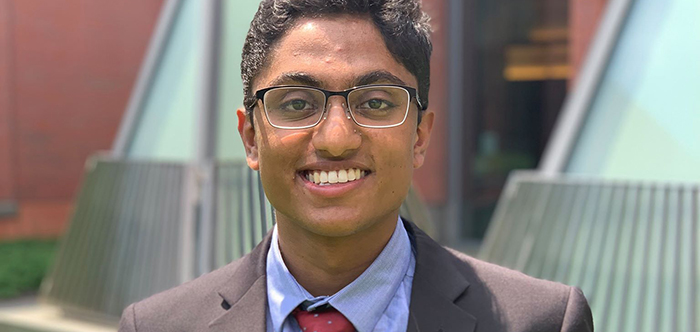
Arjun Neervannan, 17, of Irvine was selected by OCSEF earlier this year to apply for the Virtual International Science and Engineering Fair with his project on Cyberbullying. He received the 10th Place award in the 2020 Regeneron Science Talent Search.
“I was ecstatic and somewhat surprised,” Arjun said about his big achievement, “but also happy that my past two years of work on the project had paid off in an outsized way. It was a great affirmation for my research in tackling toxic language-based cyberbullying with a different method. I’m also happy that I get to share my message about finding a different solution to [cyberbullying] and hope that other students are also inspired by my work.”
Neervannan is no stranger to the OC Science and Engineering Fair. Earlier this year, he won 1st place in the OCSEF Behavioral Science Category (Senior Division), with his project titled ‘Combating Cyberbullying and Toxicity by Teaching AI to Use Linguistic Insights from Human Interactions in Social Media.’ This was his third consecutive OCSEF award.
In 2019 he won 2nd place in the Mathematics and Software category (Senior Division), in 2018 he received an Honorable Mention.
“The ‘switch’ from the Mathematics and Software [category] to Behavioral Science was not an intentional one that I made,” Neervannan says. “My interest shifted from the pure math/theory side of AI and machine learning to using such technologies for social good. My project category also shifted along with that. As I go to college and pursue my interest in Computer Science, AI, and machine learning, I hope to learn more about both the theoretical aspects of the field while also applying these to practical applications that solve a pressing social need.”
On July 29, Regeneron announced the 2020 winners of their annual Talent Search and Arjun won 10th place, receiving a $40,000 for his development of AI software designed to identify hateful or toxic content, often a form of cyberbullying, online with less bias than current programs. Algorithms with built-in biases that associate toxicity with racial, gender and other such identity terms can result in inappropriate censoring of productive discussions. Arjun believes his scalable, automated ‘debiasing’ process produces a more accurate and fair AI model.
“As a user of social media, I’d frequently noticed toxic and hateful language that was sometimes left unmitigated by the moderator algorithms,” Arjun says. “Many of these abusive comments often use terms such as ‘gay’ or ‘African American’ to attack another person. However you could also be discussing about LGBT rights or the history of slavery. Often the tools designed to block these toxic comments incorrectly assume that just the mere use of these words mean that the sentence is abusive, thus exhibiting a bias towards these words, and end up censoring a legitimate discussion.”
His neural network incorporated several new features including a “debiasing element,” a dataset expanded with counter examples containing the identity terms. Then he trained his model on over 99,000 online comments.
“I realized what we need is a tool that censors toxic comments without censoring legitimate discussions on sensitive topics – just as a real human who understands the context would.
Written for forums in English, his model could be expanded to other languages.
The Regeneron Science Talent Search, a program of Society for Science & the Public since 1942, is the nation’s oldest and most prestigious science and math competition for high school seniors. Each year, around 2,000 student entrants submit original research in critically important scientific fields of study and are judged by leading experts in their fields. Unique among high school competitions in the U.S. and around the world, the Regeneron Science Talent Search focuses on identifying, inspiring and engaging the nation’s most promising young scientists who are creating the ideas that could solve society’s most urgent challenges.
At University High School, Arjun is president of the Technology Student Association, holding regular meetings and workshops on AI, robotics, CAD and Arduino. He also helped form an all-girls robotics team in Nigeria, the first of its kind in West Africa. Arjun is also a passionate Carnatic violinist and has given many concerts, including a 3.5-hour duet with his brother in 2018.
“While I wish the STS finals week experience could have been in person, I’m still very happy that it happened this year, ” says Arjun, “and the online experience definitely blew my expectations out of the water, mostly thanks to the amazing SSP staff who ran the event so smoothly. I hope to meet the other finalists in person when the pandemic is over.”
